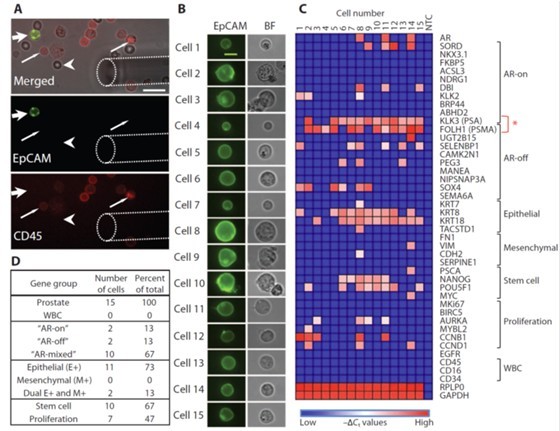YT-H711 YT-H711 Shenzhen Sunshine Technology Co.,Ltd , https://www.yatwin.com
BioMark HD platform for CTC single cell analysis
Press: A surface antigen EpCAM-negative or means (CTC-iChip) positive circulating tumor cells (CTC) can be isolated from whole blood of cancer patients has recently been developed, in conjunction with the BioMarK HD platform Fluidigm Corporation, may be of a single CTC Cell level analysis strongly promotes the application of CTC analysis in clinical detection and monitoring of cancer.
People usually want to hear good news first to help deal with the inevitable bad news that comes along. However, according to the latest research by Ozkumur and colleagues, patients can quickly get both positive and negative results. They developed a multi-step microfluidic device that can separate rare CTCs (circulating tumor cells) that are positive or negative for surface antigen EpCAM (epithelial cell adhesion molecule).
EpCAM + cells found in the blood have long defined a typical CTC. Many separation techniques have been developed to count EpCAM + CTCs in the blood of tumor patients; however, for cancers with low EpCAM expression, these cells are not always detectable, such as triple negative breast cancer or melanoma. Ozkumur et al. designed an automated platform called “CTC-iChip†that captures both EpCAM + and EpCAM - cancer cells from clinical samples through a series of cytoreductive, inertial focusing and magnetic separation steps. The isolated CTCs can then be analyzed by standard clinical methods such as immunocytochemistry. The authors tested the "positive pattern" of the device using whole blood from patients with prostate cancer, lung cancer, breast cancer, pancreatic cancer, and colorectal cancer. After successful isolation of EpCAM + CTCs, they confirmed that these cells were active and that high quality RNA was available for molecular analysis. In one example they tested EML4-ALK gene fusion in lung cancer. Using the "negative mode" of the device, the authors successfully captured EpCAM - CTCs from patients with metastatic breast cancer, pancreatic cancer, and melanoma. These isolated CTCs have a similar appearance compared to the primary tumor tissue from the patient, indicating that the microfluidic device can be used for clinical diagnosis and provides both positive and negative information.
Ozkumur et al. also demonstrated that CTCs isolated using iChip can also be analyzed at the single cell level. As an example, 15 CTCs isolated from a prostate cancer patient revealed significant heterogeneity in mesenchymal and stem cell markers, as well as typical prostate cancer-associated antigens (using the Fluidigm BioMark HD platform). This CTC-iChip can process a large number of patients' blood to simultaneously obtain EpCAM + and EpCAM - CTCs, which can better reveal the cancer status of individual patients and make the device suitable for more cancer types. With the ability to further analyze the molecular characteristics of CTCs, this CTC-iChip is a very promising addition to existing diagnostic tools in the clinic.
Figure: The BioMark HD platform revealed heterogeneity in gene expression of 15 CTCs isolated from prostate cancer patients at the single cell level. (A) Separation of CTCs using CTC-iChip; (B) Imaging of 15 CTCs; (C) Heat map of 43 gene expression levels of 15 CTCs using the BioMark HD platform; (D) 15 CTCs based on Statistical results of gene expression.
references
Inertial Focusing for Tumor Antigen - Dependent and - Independent Sorting of Rare Circulating Tumor Cells. Emre Ozkumur et al. Sci Transl Med 5, 179ra47 (2013); DOI: 10.1126/scitranslmed.3005616.
Next Article
What do you eat for baby in summer?
Prev Article
How to make piglets move smoothly